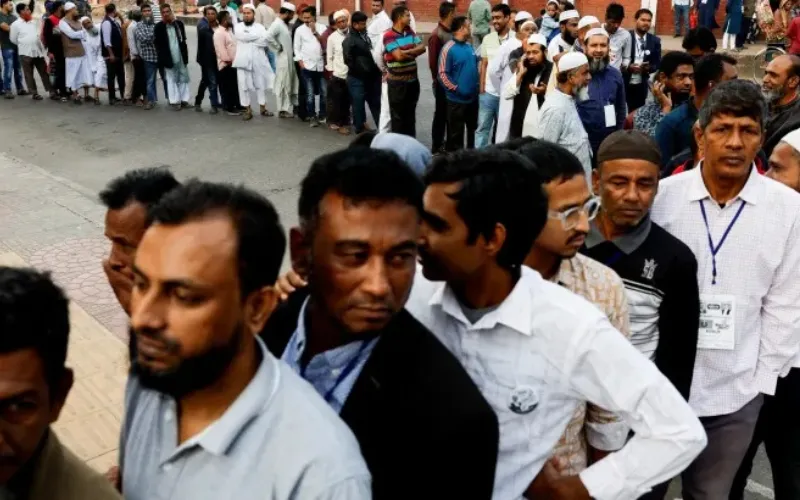The Enforcement Directorate has summoned, questioned or raided nearly 150 politicians from the opposition since Modi took power in 2014.
India’s main financial crime fighting agency has investigated well over a hundred opposition politicians in the past decade, drawing criticism it has become a weapon of Prime Minister Narendra Modi and his party to cull political opponents.
In the latest in a wave of detentions, raids and questioning of opposition politicians, the Enforcement Directorate (ED) arrested one of Modi’s most trenchant critics on Thursday, just a month before India holds a national election.
India’s opposition has been struggling to close the wide gap in opinion polls with Modi in the run-up to the election starting on April 19, but it says it is being targeted by the ED and other federal agencies at the behest of the ruling Bharatiya Janata Party (BJP).
Rahul Gandhi, the highest-profile leader in the opposition Congress, says his party has been “crippled” by Modi’s government with tax demands that have led to the freezing of its bank accounts.
“A scared dictator wants to create a dead democracy,” he said of the ED’s arrest on Thursday of Delhi region Chief Minister Arvind Kejriwal, whose party is aligned with Congress and who was seen as a likely star campaigner against the BJP.
The ED, the most powerful of the federal agencies, can search and arrest without warrant. It has summoned, questioned or raided nearly 150 politicians from the opposition since Modi took power in 2014, according to data compiled by Reuters based on court records, party statements and media reports. Both Gandhi and his mother have been questioned in a case relating to alleged money laundering.
In that time, four BJP politicians have been targeted by the ED, according to the data.
Modi said in a speech last week that “a major aspect of our governance is zero tolerance towards corruption”. “All agencies are completely independent to act against corruption,” he said. Other BJP leaders said investigators were just following the law.
The prime minister’s office did not respond to multiple requests for further comment. The ED said it operates without discriminating between political parties, but declined to share any figures. It declined comment on individual cases.
Of the opposition politicians in the scrutiny of the ED, at least a dozen have switched allegiance to the BJP or its alliance in recent years, including three in the past month, according to the compiled data. The opposition says investigations of those who defect are dropped or put on hold.
Kejriwal was arrested by the agency for alleged corruption in awarding liquor licences in the city. He has denied the allegation.
He said earlier this month: “People are harassed by the ED to coerce them into joining the BJP. If I join the BJP today, I will also stop getting summons from the ED.”
The arrest means the main leaders of Kejriwal’s decade-old Aam Aadmi Party (AAP) are in jail or ED custody, following the arrests last year of his deputy and another senior colleague in the same case – which the party has called “dirty politics”.
Joining the BJP
In West Bengal state in India’s east, opposition lawmaker Tapas Roy said his office and house were raided by the ED in January in a corruption case. Weeks later, he joined the BJP. He has not heard from the agency since, he says.
“There was absolutely no pressure from the BJP to join it,” Roy told Reuters. “I think I will have an opportunity to serve the people with this rising national party.”
Asked if he thought the investigation into him would now be put on the back burner, he said: “The investigations should be put on the fastest track.”
Modi said last week the ED has registered 4,700 cases since he came to power compared with 1,800 by the previous government, headed by Congress. Properties worth more than 1 trillion rupees ($12 billion) have been seized in the past decade, up from 50 billion rupees in the Congress era.
Sandeep Shastri of political research firm Lokniti Network said the “selective use of agencies for the benefit of the government in power” was not new in India.
“There needs to be a little more transparency in how, and the logic that these agencies use in choosing where and whom they would like to investigate,” he said.
In January, the ED arrested the chief minister of the eastern state of Jharkhand, Hemant Soren, in a case related to alleged land fraud. Soren, who is allied to Congress, said hours before the arrest that he was the victim of a political conspiracy.
His Jharkhand Mukti Morcha party said more than 1,000 opposition politicians, including current or former lawmakers, who had earlier been accused of corruption by the BJP have defected to the ruling party or have become its allies in the past decade.
Reuters could not independently confirm the number of defectors. The BJP declined comment.
‘Weaponised’
The ED is one of the smallest federal anti-crime agencies. It has only about 2,000 employees, compared to about 7,000 in the Central Bureau of Investigation, which is patterned on the FBI.
The Prevention of Money Laundering Act, which came into effect in 2005, allows the ED to summon an individual without giving reasons.
In the first nine years of the act, when a Congress-led coalition was in power, the ED carried out 112 searches and filed charges in 104 cases but without any convictions, according to data from the Ministry of Finance that runs the ED. In the first eight years of Modi’s rule from 2014/15 and 2021/22, searches jumped to 3,010, charges were filed in 888 cases, and 23 people were convicted.
Not just politicians have been investigated by the ED. Rights group Amnesty International halted its work in India in October 2020 after the ED froze its bank accounts on charges of Amnesty channelling large amounts of money to four entities in India in contravention of laws governing foreign financing.
“Financial and investigative agencies of the government have been weaponised to harass, intimidate, silence, and criminalise independent critical voices in the country,” Amnesty said.
Header photo: A security personnel walks past a gate of the office of Directorate of Enforcement in New Delhi, India, March 13, 2024. —Reuters/Anushree Fadnavis




